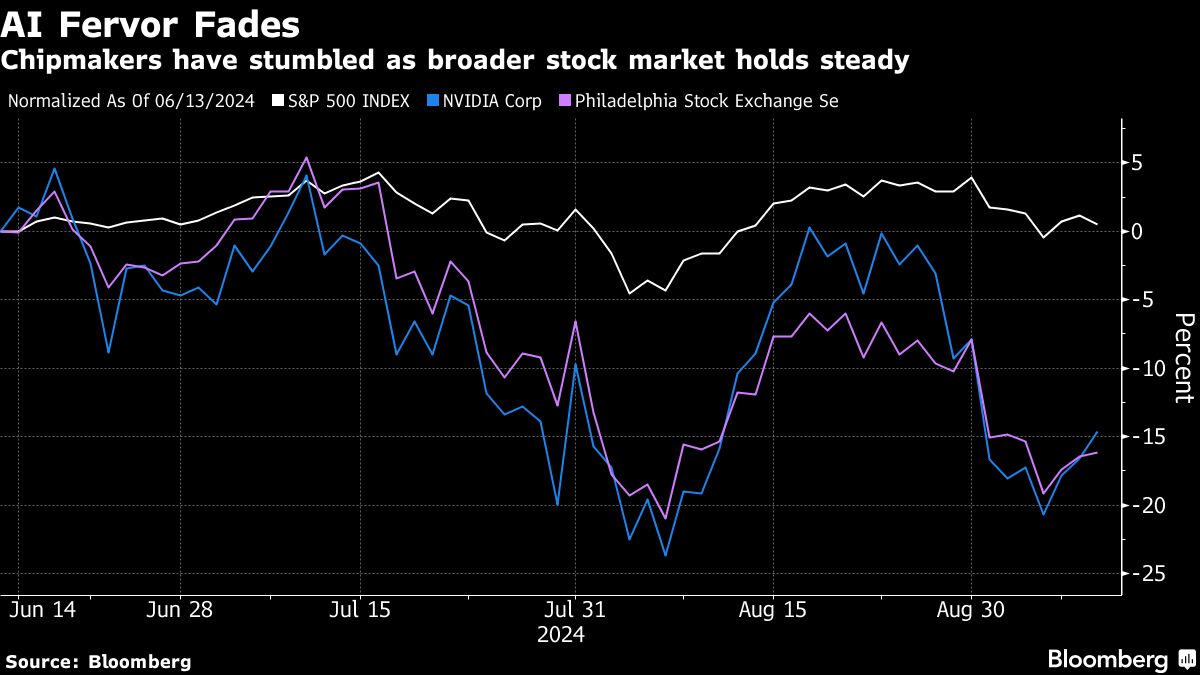
(Bloomberg) — The artificial intelligence boom that powered the S&P 500 Index to record highs earlier this year is fizzling out, so the stock market needs a new catalyst if the rally is going to resume, according to Morgan Stanley’s Mike Wilson.
Most Read from Bloomberg
While AI could very well transform productivity over time, investors who bid up equities on its potential in the short-term were premature, the bank’s chief US equity strategist said Wednesday in an interview with Bloomberg Television. Now it’s showing up in struggling chip stocks, and not just poster child Nvidia Corp.’s recent swings, he added. The Philadelphia Semiconductor Index is down 8.5% this month.
Read: Risk-On Momentum in Stocks Succumbs to Mounting Growth Worries
“The AI dream — a little bit of that luster has come off,” he said. “We just got overcooked on the whole AI theme. It doesn’t mean it’s over.”
Investors have been reducing their exposure to technology high-flyers after snapping them up for much of the year. With the Federal Reserve prepared to start cutting interest rates as soon as next week, they’re shifting to other pockets of the market as they gauge the health of the US economy.
Wilson reiterated his preference for quality defensive stocks, recommending areas such as utilities, consumer staples, and health care as the fervor around chipmakers fades, at least temporarily. Investors are likely to hide out in those sectors until they get the “next thing, whether it is a bad outcome or a positive outcome,” he said.
US stocks fell Tuesday morning after a key measure of inflation rose more than expected in August, raising concerns that the Fed won’t cut rates as much as traders are hoping. The so-called core consumer price index — which excludes food and energy costs — increased 0.3% from July and 3.2% from a year ago.
Before the report was released, Wilson said that the figure needed to “thread the needle,” meaning a higher-than-anticipated number could leave the Fed behind the curve and a substantial drop in inflation would harm corporate pricing power.
The strategist warned that front-loading interest rate cuts with a 50-basis-point reduction at this meeting “materially” reduces the chances of a soft landing. Some traders had been speculating that policymakers will employ a supersized cut right out of the gate, but following the higher CPI print they’ve backed off and largely cemented odds of a quarter-point reduction.
The bigger wild card during the Fed’s meeting next week, according to Wilson, is whether officials speak more aggressively about ending quantitative tightening quickly or offer other provisions to provide liquidity. That could surprise markets and serve as a “bull case” for stocks, he said.
In early July, Wilson correctly warned that the market is due for a substantial pullback due to heightened uncertainty around Fed policy, corporate earnings and the US election. Less than a month later, the S&P 500 tumbled 8.5% from its peak to its August low. However, the strategist also predicted a stock-market rout last year that failed to materialize.
Looking at the election, Wilson thinks that in a soft landing scenario former president Donald Trump’s growth policies are likely good for stocks and bad for bonds.
“I do think the stock market is pro-Trump,” he said. “The stock market has traded better when his odds go up, and vise versa.”
–With assistance from Matt Turner, Annmarie Hordern, Lisa Abramowicz and Jonathan Ferro.
Most Read from Bloomberg Businessweek
©2024 Bloomberg L.P.
EMEA Tribune is not involved in this news article, it is taken from our partners and or from the News Agencies. Copyright and Credit go to the News Agencies, email news@emeatribune.com Follow our WhatsApp verified Channel




